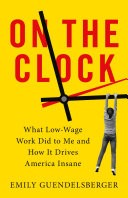Review of 'On the Clock: What Low-Wage Work Did to Me and How It Drives America Insane' on 'Goodreads'
3 stars
Wonder what it's like working at a low-wage job in America? This book explains what it's like, how they sleep, what their life outside of work is like, and how it affects more than just themselves.
"At SDF8, I pop Advil like candy all day, not even bothering to track when my last dose was. I don’t talk to anyone at break or lunch; I’m too tired. My head pounds, and I feel generally dull. By the end of my shift, I’m almost staggering from the stabbing pain in my feet and trying to lean some of my weight on my cart as I push it, as if it’s a walker."
While this book is really centred in America (and American companies), the experiences are applicable for almost any low-wage job in the world. If you don't like American-centred books then skip this one.
"but my smugness fades as I …
Wonder what it's like working at a low-wage job in America? This book explains what it's like, how they sleep, what their life outside of work is like, and how it affects more than just themselves.
"At SDF8, I pop Advil like candy all day, not even bothering to track when my last dose was. I don’t talk to anyone at break or lunch; I’m too tired. My head pounds, and I feel generally dull. By the end of my shift, I’m almost staggering from the stabbing pain in my feet and trying to lean some of my weight on my cart as I push it, as if it’s a walker."
While this book is really centred in America (and American companies), the experiences are applicable for almost any low-wage job in the world. If you don't like American-centred books then skip this one.
"but my smugness fades as I see that everything, including my car, has been aggressively coated in ice. It’s been a mild winter so far, but of course it’s freezing two hours before sunrise. You idiot."
"It’s been eight months since I’ve had a steady paycheck. My savings are gone, and Car Life seems like a mild inconvenience compared to jacking up my credit-card balance even further or having another miserable forty-five-minute commute every day."
There were some times that a word didn't make sense in context with the other words, I'm not sure if that's an error on editing.
The writer loved to include stories from the past, which got repetitive after a while, so I tended to skip over them, and I didn't miss out on any context or part of the writer's experience.
The writer knows how to included humour and good jokes, I wish they included them more to break up the book.
"Today, my bracelet recorded more than thirty thousand steps. I start giggling helplessly as I work out the math. That’s more than fifteen miles. Fifteen! Fucking! Miles! It’s the funniest, most horrible thing I’ve ever heard."
"Scrooge literally has a better time-off policy than Amazon"
There is a huge amount of detail in this book, sometimes it's great to have, and sometimes I found it wasn't needed.
"But, more important, if Vicki’s saying what I think she’s saying—if it’s part of her job to change our official time-clock records to reflect only the time we’re logged in to the phones—that sounds an awful lot like wage theft."
The author touched on the different class system (like those who work low-wage jobs, and those who work in tech jobs). I almost wish the author spent more time covering that.
"Because if you don’t really know anybody outside your class, you can’t really understand the embarrassingly large disconnect between the actual working class and the kind of people who shape public opinion and policy."
"Do you want to win elections? Acknowledge that something’s wrong and offer people a different why.
So, why can’t employers find good workers to fill open positions? Because the drawbacks of the jobs they’re offering outweigh the benefits.
Why do people vote against their self-interest? Because when national politics hasn’t truly improved the lives of the non wealthy in decades and is covered like sports, why take it any more seriously than professional wrestling?
If the data says everything’s so great, why is America freaking the fuck out? Because the systems we use to compile and analyze data don’t consider America freaking the fuck out to be relevant information."
The conclusion chapter I found to be weird as it does wrap the book up, it does so in a way that requires you to remember almost random things that were mentioned in the book.
The author does include footnotes (in the eBook version) which I found helped to provide more context, and some provided humour.
Overall, an interesting book if you are interested in American low-wage jobs and what those people go through.
"After that, I knew not to be honest with customers in the same visceral way I know not to stick my hand in a fire."
"even the cheapest, most discounted motel is completely unsustainable for a single person making $9.50 an hour"
"some part of me finally accepts that you need walls between you and the customers to survive here, and I start building them. I still do everything I’m supposed to, of course. I just… stop caring. Caring makes you vulnerable."
"I get to leave"

